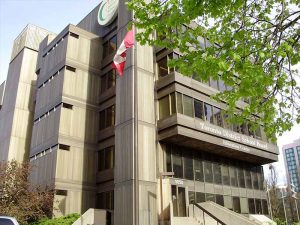 TORONTO — Jewish university students are dreading the annual ritual known as Israeli Apartheid Week (IAW), slated to take place on campuses across the country March 1 to 7.
TORONTO — Jewish university students are dreading the annual ritual known as Israeli Apartheid Week (IAW), slated to take place on campuses across the country March 1 to 7.
Poster from this year’s Israel Apartheid Week
But this year, they’ll get a one-week head start on the anti-Israel informational campaign.
Starting the last week of February, Canadian university and college students will begin a pre-emptive, national initiative aimed at bolstering Israel’s image and countering negative propaganda. “Size Doesn’t Matter” will stress that for a small country, Israel has achieved global renown in science, medicine, technology, business, humanitarian aid and even on cultural fronts.
“We’re starting a week before [the IAW kick-off] on all campuses,” says Shirin Ezekiel, director of Israel affairs for Hillel of Greater Toronto. “Each day will highlight a different achievement and contribution from Israel.”
The second national push, to run concurrently with IAW, will be called “The Truth Campaign,” and will feature toy building block-themed posters with the messages, “Don’t Twist the Truth” and “Don’t Play With the Truth.”
They’re intended to counter the five central themes of this year’s anti-Israel IAW programming: the ongoing boycott, divestment and sanctions (BDS) drive against the Jewish state; fallout from the United Nations’ Goldstone report on Israel’s incursion into Gaza in last winter; the attack on Gaza itself, known as Operation Cast Lead; Israel’s security barrier, often tagged by opponents as the “Apartheid Wall”; and the central accusation that Israel practises apartheid against Arabs and Palestinians, which the counter-measures will term “the apartheid lie.”
A third, undisclosed campaign involving “social media” will be “a surprise,” Ezekiel said.
Several pro-Israel speakers are scheduled to appear. “We’re trying to target the 80 per cent of students who just walk by and don’t really care.”
Among the “endorsers” of this year’s Israeli Apartheid Week, according to the IAW’s website, is “Holy Land Awareness and Action – United Church of Canada.”
The Holy Land awareness and action committee, a subcommittee of the Church’s Toronto conference’s South West Presbytery, was one of the forces behind calls for a comprehensive boycott of Israel last August at the church’s General Council meeting in Kelowna, B.C.
All the anti-Israel measures were voted down after delegates heard impassioned speeches from Canadian Jewish Congress.
Still, that episode and others strained relations between the church and many Jews. A Feb. 1 meeting between representatives of the Church and the CJC sought to patch up differences.
A major irritant for CJC had been that the United Church, Canada’s largest Protestant denomination, helped fund the creation of Independent Jewish Voices (IJV), a small anti-Israel group that supports the BDS movement. The church has conceded that it “regretted” its prior relationship with the group.
IJV is among the supporters of this year’s IAW.
Nora Saunders, general secretary of the church’s General Council, said the involvement of the Holy Land awareness and action committee in IAW doesn’t mean the national church is onside.
“There has been no endorsement [of IAW] by the United Church of Canada as a whole. This is something that’s being dealt with locally as people feel moved to take steps,” she told The CJN.
Congress CEO Bernie Farber said Saunders’ remarks “follow exactly the discussion” Congress had with the church earlier this month.
“However,” Farber added, “it is incumbent on the church to ensure that in the future local affiliates are clearly identified as local.”
The sixth annual IAW will feature lectures, film screenings, cultural activities, and demonstrations aimed at “raising awareness about Israel’s apartheid policies toward Palestinians and to gather support for the international boycott, divestment and sanctions campaign,” a statement said. It added that the campaign takes place in 40 cities around the world.
According to the IAW website, Canadian cities slated for activity are Edmonton, Guelph, Halifax, Hamilton, Kingston, Montreal, Ottawa, Peterborough, St. Catharines, Sudbury, Toronto, Vancouver, Waterloo and Winnipeg.
As of last week, schedules of activities and speakers were posted only for Toronto and Ottawa, where programs are scheduled at Carleton University and the University of Ottawa.
The annual event is always a time of high tensions for Jewish students, Ezekiel said. “It’s never quiet during that time. It’s not exactly the most comfortable time for students on campus.”
Verbal confrontations “can get pretty intense.”
IAW “causes a hateful, divisive and intolerant atmosphere” on campus for all students, said Lindsay Lustig, a graduate student in science at the University of Toronto. “It’s a toxic environment and it promotes separation of students.”
It also shuts down legitimate dialogue “before it can begin,” she said.
Jews of all affiliations and levels of involvement “feel threatened” during IAW, said Ryerson University political science student Esther Mendelsohn. “You can’t really go to class, feel calm and do your work when you’re bombarded with all these events and images,” she said.
In Toronto, the public is invited to hear speakers defending Israel. They will include Simon Deng, a Sudanese human rights activist and one-time child slave (Feb. 23, 7 p.m. at Ryerson University, room SCC115; Israeli-Arab journalist Khaled Abu Toameh (March 1, 7 p.m. Ryerson, library hall 72); and Kamal Saleem, a one-time terrorist who renounced radical Islam (March 1, 7 p.m., U of T, Innis Hall).
Colours of Comedy, which brings together comedians of diverse faiths and ethnic background, will stage a show on March 4, 7 p.m. at U of T’s Robert Gill Hall.






